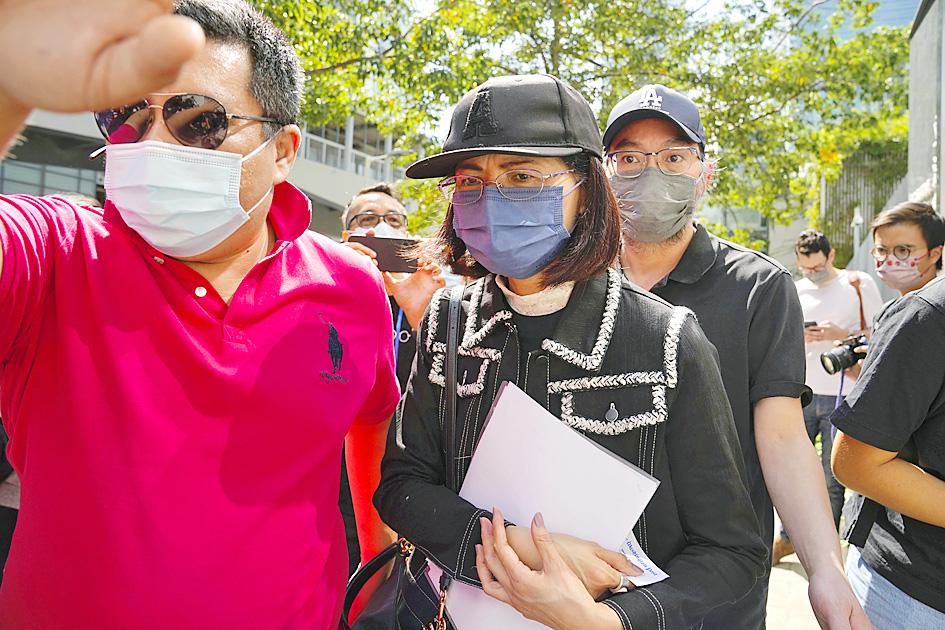The mother of a murdered Hong Kong woman yesterday blasted the authorities for allowing her daughter’s killer to live as a free man, a case that has festered because China does not recognize Taiwan.
Poon Hiu-wing (潘曉穎), 19, was pregnant when she was strangled by her boyfriend, Chan Tong-kai (陳同佳), during a Valentine’s Day trip to Taiwan in 2018.
The murder, which Chan has admitted to, sparked a chain reaction that led to huge democracy protests the following year and has been a source of embarrassment for the Hong Kong government.

Photo: AP
Poon’s mother — who has never revealed her name — held an emotional news conference outside the government headquarters yesterday, calling on authorities to either fly Chan to Taiwan or prosecute him locally for murder.
“The Hong Kong government believes that this felon, who can kill again at any time, is fit to walk the streets and threaten people’s lives,” she told reporters.
Chan had “never faced consequences for murder,” she said, after it was revealed earlier this month that he had left police protection and was free to live a normal life.
Hong Kong prosecutors said that they had no jurisdiction to try him for murder. They also declined to send Chan to Taiwan.
After Poon’s murder, the territory tried to pass a law that would allow extraditions to both Taiwan and mainland China, but that sparked protests by Hong Kongers who feared that the law could see them disappear into mainland China’s opaque courts.
Those rallies soon morphed into huge and often violent democracy demonstrations, which convulsed the territory for seven straight months in 2019.
Chan served a short jail sentence in Hong Kong on money laundering charges, as he was in possession of Poon’s credit card on his return from Taiwan. It was during those proceedings that he admitted to killing her.
Chan previously said via an intermediary that he was willing to face justice in Taiwan, but no steps have been taken by him or the Hong Kong authorities to make that happen.
Taiwan and Hong Kong have blamed each other over the impasse.

‘DENIAL DEFENSE’: The US would increase its military presence with uncrewed ships, and submarines, while boosting defense in the Indo-Pacific, a Pete Hegseth memo said The US is reorienting its military strategy to focus primarily on deterring a potential Chinese invasion of Taiwan, a memo signed by US Secretary of Defense Pete Hegseth showed. The memo also called on Taiwan to increase its defense spending. The document, known as the “Interim National Defense Strategic Guidance,” was distributed this month and detailed the national defense plans of US President Donald Trump’s administration, an article in the Washington Post said on Saturday. It outlines how the US can prepare for a potential war with China and defend itself from threats in the “near abroad,” including Greenland and the Panama

A magnitude 4.9 earthquake struck off Tainan at 11:47am today, the Central Weather Administration (CWA) said. The hypocenter was 32.3km northeast of Tainan City Hall at a depth of 7.3km, CWA data showed. The intensity of the quake, which gauges the actual effect of a seismic event, measured 4 in Tainan and Chiayi County on Taiwan's seven-tier intensity scale, the data showed. The quake had an intensity of 3 in Chiayi City and County, and Yunlin County, while it was measured as 2 in Kaohsiung, Nantou County, Changhua County, Taitung County and offshore Penghu County, the data showed. There were no immediate reports of

The Chinese Nationalist Party (KMT) is maintaining close ties with Beijing, the Democratic Progressive Party (DPP) said yesterday, hours after a new round of Chinese military drills in the Taiwan Strait began. Political parties in a democracy have a responsibility to be loyal to the nation and defend its sovereignty, DPP spokesman Justin Wu (吳崢) told a news conference in Taipei. His comments came hours after Beijing announced via Chinese state media that the Chinese People’s Liberation Army’s Eastern Theater Command was holding large-scale drills simulating a multi-pronged attack on Taiwan. Contrary to the KMT’s claims that it is staunchly anti-communist, KMT Deputy

RESPONSE: The government would investigate incidents of Taiwanese entertainers in China promoting CCP propaganda online in contravention of the law, the source said Taiwanese entertainers living in China who are found to have contravened cross-strait regulations or collaborated with the Chinese Communist Party (CCP) could be subject to fines, a source said on Sunday. Several Taiwanese entertainers have posted on the social media platform Sina Weibo saying that Taiwan “must be returned” to China, and sharing news articles from Chinese state media. In response, the Mainland Affairs Council (MAC) has asked the Ministry of Culture to investigate whether the entertainers had contravened any laws, and asked for them to be questioned upon their return to Taiwan, an official familiar with the matter said. To curb repeated